Showing 281-290 of 405 results
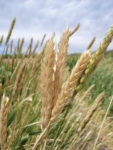 southern.sare.org news 2021-ssare-graduate-student-grant-call-for-proposals-now-open
southern.sare.org news 2021-ssare-graduate-student-grant-call-for-proposals-now-open 2021 SSARE Graduate Student Grant Call for Proposals Now Open
GRIFFIN, Georgia – The Southern Sustainable Agriculture Research and Education (SSARE) program has released the 2021 Call for Proposals for Graduate Student Grants. Southern SARE Graduate Student Grants are open to Master’s and PhD students, enrolled at accredited institutions across the Southern region, who are interested in exploring areas of sustainable agriculture through quantitative and […]
 northeast.sare.org news graduate-students-encouraged-to-apply-for-northeast-sare-grants
northeast.sare.org news graduate-students-encouraged-to-apply-for-northeast-sare-grants Graduate Students Encouraged to Apply for Northeast SARE Grants
Graduate students at any accredited Northeast university, college or veterinary school are invited to submit proposals to the Northeast Sustainable Agriculture Research and Education (SARE) Graduate Student Research Grant Program. The deadline to apply is April 27 at 5 p.m. The program funds graduate student research focused on sustainable agriculture using either or both natural and […]
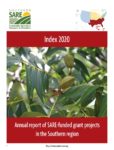 southern.sare.org news southern-sare-publishes-the-annual-index-report
southern.sare.org news southern-sare-publishes-the-annual-index-report Southern SARE Publishes the Annual Index Report
GRIFFIN, Georgia – The 2020 Index, Southern SARE’s annual report of active grant-funded projects, has been published. The Index Report highlights grant-funded projects and lists all on-going grant projects from across Southern SARE’s grant programs. These grant programs are divided into five categories; Research & Education, Professional Development Program, Graduate Student, Producer and On-Farm Research. […]
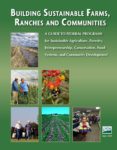 www.sare.org news updated-guide-to-usda-programs-opens-door-to-millions-of-dollars-of-available-funding
www.sare.org news updated-guide-to-usda-programs-opens-door-to-millions-of-dollars-of-available-funding Updated Guide to USDA Programs Opens Door to Millions of Dollars of Available Funding
Building Sustainable Farms, Ranches and Communities covers 62 government programs and has been updated to include program updates from the 2018 Farm Bill. Each program listing provides a description of the program’s available resources, information on how to apply, and in some cases, examples of how the funding has been used.
 southern.sare.org news amid-natural-disasters-pandemic-training-program-helps-small-farmers
southern.sare.org news amid-natural-disasters-pandemic-training-program-helps-small-farmers Amid Natural Disasters, Pandemic Training Program Helps Small Farmers
On the Northern coast of Puerto Rico, 50 miles west of San Juan, the city of Arecibo and surrounding area is home to some of the world’s most fertile soil and diverse farmland. A series of earthquakes and hurricanes have struck the island in recent years, damaging critical farming infrastructure like buildings, roads, irrigation equipment […]
 western.sare.org news putting-the-winter-back-in-winter-squash
western.sare.org news putting-the-winter-back-in-winter-squash Putting the Winter Back in Winter Squash
For growers, it doesn’t matter how much you harvest. What matters is what you sell! A good example of that came out of Oregon recently, but applies broadly. Growers were having trouble producing and storing a crop they for sale in the winter into the early spring. “We heard from farmers that they weren't making […]
 southern.sare.org news soil-management-course-brings-healthier-soil-to-tennessee
southern.sare.org news soil-management-course-brings-healthier-soil-to-tennessee Soil Management Course Brings Healthier Soil to Tennessee
NASHVILLE, Tennessee - Healthy soil plays an important role in the economic and environmental sustainability of farms. While awareness for the benefits of healthy soil has increased in recent years, a lack of technical and financial information on some beneficial soil management practices has limited adoption in Tennessee. To solve this, Jason de Koff at […]
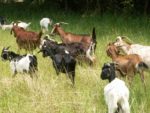 southern.sare.org news the-2020-southern-sare-large-systems-grant-is-released
southern.sare.org news the-2020-southern-sare-large-systems-grant-is-released The 2020 Southern SARE Large Systems Grant is Released.
The Southern Sustainable Research and Education Program has announced its 2020 Large Systems Grant award. The project will create a group of 1890 Universities and farmer cooperators to conduct large systems research on sustainable meat goat production and marketing. Large systems research is designed to increase our understanding of the complex relationships between parts in […]
 southern.sare.org news sare-offering-free-webinar-on-the-graduate-student-grant-program
southern.sare.org news sare-offering-free-webinar-on-the-graduate-student-grant-program SARE Offering Free Webinar on the Graduate Student Grant Program
GRIFFIN, Georgia – The Sustainable Agriculture Research and Education (SARE) program will be holding a free webinar on December 15 for Master’s and PhD students interested in learning more about and applying for Graduate Student Grants. Graduate Student Grant program coordinators from each SARE region (Southern, Western, Northeast and North Central) will present an in-depth, […]
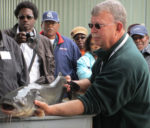 southern.sare.org news southern-sare-seeking-nominations-to-fill-vacant-producer-seat-on-the-administrative-council
southern.sare.org news southern-sare-seeking-nominations-to-fill-vacant-producer-seat-on-the-administrative-council Southern SARE Seeking Nominations to Fill Vacant Producer Seat on the Administrative Council
GRIFFIN, Georgia -- Interested in sustainable agriculture and are looking to have an impact on sustainable agriculture practices in your community? The Southern SARE program gives producers the opportunity to serve on the Administrative Council and provide a “voice” for the direction of sustainability across the Southern region. Southern SARE is seeking a producer to […]